About the training: “I found it very rewarding”
Radford, who was joined by more than 400 other Olympic athletes, said the forum “created a relationship with so many different athletes from different backgrounds, different sports and countries around the world… [and] We’re all kind of in the same boat.
“I think one of the most important things I learned at this event is the different methods and tools that need to be used to create a sense of community in our sport,” he said.
Radford will be taking some of those tools to the ice as well in his new journey as a coach.
“I think because I had so much experience as an athlete, I thought, you know, getting into coaching would be kind of easy,” he admitted. “But it’s a unique skill. I think it takes a different kind of understanding, a different kind of analysis. You have to break things down into different parts that you didn’t have to do as an athlete.”
“I found it challenging but very rewarding, and I think I started to learn more about myself as a coach.”
Radford said it was more expressive of the ice and basic skating technique versus high-level skills, something he said was surprising.
Is he a difficult coach?
“I think Eric Radford is not a difficult coach at all,” he replied. “I guess I just expect athletes, if they’re there [on the ice]This is because they want to be there and they want to work hard. If an athlete starts to feel tired or lazy, it is just a waste of his time and my time.
The experience has made him grateful for the coaches who have trained with him in the past – and also made him more aware of the teaching techniques they used to reach him and his partners.
“I was thinking about the way they were teaching, and what they were saying,” he said. “Now I feel like a lot of things are on my mind and I feel lucky to have been able to benefit from every coach… [even now] If I’m ever struggling or if I’m a little lost and don’t really know how to handle a situation, I have these people there to guide me.












































